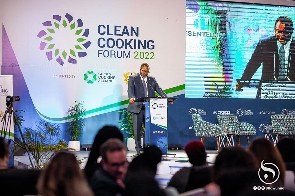 Energy Minister, Dr Matthew Opoku Prempeh
Energy Minister, Dr Matthew Opoku Prempeh
Energy Minister, Dr. Matthew Opoku Prempeh has disclosed that the ministry is developing a National Clean Cooking Strategy and Investment Prospectus to promote and develop the industry. The move, which is supported by the World Bank, is expected to be completed and launched by end of this year. In Ghana, the World Bank estimates that “16,000 people die prematurely from air pollution every year’’ and the lack of access to clean cooking is a contributing factor. Also, Sustainable Energy for All estimates that it could take the country about 50 years to fully transition from wood and charcoal to clean fuels. Speaking at the opening plenary of the 2022 Global Clean Cooking Forum held in Accra, the minister said his outfit is also partnering with other leading stakeholders to expand the clean cooking market in the country and scale-up access. He added that such pragmatic interventions will keep the clean cooking industry on track for investment, scaling and commercialising. “It is my earnest hope that these documents will be completed and launched by the end of the year. The Ministry of Energy is central to the development of a vibrant and sustainable clean cooking sector in Ghana,” he said. The Global Clean Cooking Forum allows for deliberation on key political and technological counter-measures to curb the environmental and socio-economic threats of over reliance and uncontrolled exploitation of natural resources, especially woody biomass, for cooking while increasing access in line with national, regional, and global commitments. “We need effective coordination and transparent accounting systems that are internationally acceptable to unlock the enormous investment and financing opportunities available for the clean cooking sector,” the minister told the global participants. He also reiterated government’s commitment to distribute 3 million improved cookstoves by 2030 under the Carbon-for-Stove project, the largest clean cooking intervention in the ECOWAS region. For her part, the Second Lady, Samira Bawumia, who doubles as a Global Ambassador for the Clean Cooking Alliance, noted that clean cooking is an essential part of achieving the world’s challenge to move to net zero by 2050. “Emission reductions have to go hand-in-hand with efforts to ensure clean energy access for all by 2030. It will take sound public policies, a holistic approach, and long-term commitment from all development actors. Reducing cooking emissions is critical to reducing forest degradation, improving health, empowering women and children, protecting the environment, and helping achieve numerous other Sustainable Development Goals (SDGs),” she added. She said it is also important to integrate and involve women in the design and production of locally appropriate clean cooking technologies. CEO of Clean Cooking Alliance, Dymphna van der Lans, also called for collective efforts to change the narratives through integrating and scaling up access globally. She emphasised that providing clean energy to households is critical to achieving global climate and sustainable development goals.
Energy Minister, Dr. Matthew Opoku Prempeh has disclosed that the ministry is developing a National Clean Cooking Strategy and Investment Prospectus to promote and develop the industry. The move, which is supported by the World Bank, is expected to be completed and launched by end of this year. In Ghana, the World Bank estimates that “16,000 people die prematurely from air pollution every year’’ and the lack of access to clean cooking is a contributing factor. Also, Sustainable Energy for All estimates that it could take the country about 50 years to fully transition from wood and charcoal to clean fuels. Speaking at the opening plenary of the 2022 Global Clean Cooking Forum held in Accra, the minister said his outfit is also partnering with other leading stakeholders to expand the clean cooking market in the country and scale-up access. He added that such pragmatic interventions will keep the clean cooking industry on track for investment, scaling and commercialising. “It is my earnest hope that these documents will be completed and launched by the end of the year. The Ministry of Energy is central to the development of a vibrant and sustainable clean cooking sector in Ghana,” he said. The Global Clean Cooking Forum allows for deliberation on key political and technological counter-measures to curb the environmental and socio-economic threats of over reliance and uncontrolled exploitation of natural resources, especially woody biomass, for cooking while increasing access in line with national, regional, and global commitments. “We need effective coordination and transparent accounting systems that are internationally acceptable to unlock the enormous investment and financing opportunities available for the clean cooking sector,” the minister told the global participants. He also reiterated government’s commitment to distribute 3 million improved cookstoves by 2030 under the Carbon-for-Stove project, the largest clean cooking intervention in the ECOWAS region. For her part, the Second Lady, Samira Bawumia, who doubles as a Global Ambassador for the Clean Cooking Alliance, noted that clean cooking is an essential part of achieving the world’s challenge to move to net zero by 2050. “Emission reductions have to go hand-in-hand with efforts to ensure clean energy access for all by 2030. It will take sound public policies, a holistic approach, and long-term commitment from all development actors. Reducing cooking emissions is critical to reducing forest degradation, improving health, empowering women and children, protecting the environment, and helping achieve numerous other Sustainable Development Goals (SDGs),” she added. She said it is also important to integrate and involve women in the design and production of locally appropriate clean cooking technologies. CEO of Clean Cooking Alliance, Dymphna van der Lans, also called for collective efforts to change the narratives through integrating and scaling up access globally. She emphasised that providing clean energy to households is critical to achieving global climate and sustainable development goals.